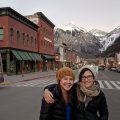
This post was written by Gretchen Hammer, a previous member of our team.
It has been a long election season.
We have seen and heard an endless stream of opinions and commentary, conflicting facts, and outrageous statements. There has been talking and more talking, talking louder, talking longer, and talking over one another. What has been almost entirely absent is any attempt to listen and understand.
I don’t mean the kind of listening where you’re formulating counter arguments in your head and waiting for a pause to jump in, and I don’t mean nodding along while you roll through a series of assumptions and judgments. I mean intense, passionate, hardcore listening. I mean really trying, with a full force of empathy, to understand someone different than ourselves.
In modern society, it can be easy to become socially separated. We have lost many of the natural opportunities we used to have to engage with people different than ourselves. It has become common to navigate our lives without ever having to appreciate the profoundly different life experiences of others.
Yet, if we are going to make progress on our shared challenges, like improving our health care system, our political system, or our civic discourse, we must pursue this appreciation and understanding of others’ experiences. It is hard work. It requires discipline, commitment, a closed mouth, and an open mind and heart.
At CCMU, we’re intent on working toward a deeper understanding of the differing experiences of health in our community. Our Health Connections Issue Brief Series got us started, but it was a broad look at all Coloradans; now we want to explore the more diverse perspectives that exist around our state.
So, we’re launching the Health Perspectives Infographic Series. Over the next year, we will share compelling facts and figures that illuminate the experiences of health for rural Coloradans, seniors, immigrants, African-Americans, and other unique populations. Starting this month, we’ll share our first installment, which looks at the health experiences of our Veterans. We hope this series will pique your curiosity to learn more about the experiences of others and encourage you to seek out new opportunities to engage with and understand how Coloradans experience health.




